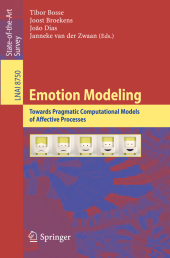 Neuerscheinungen 2014Stand: 2020-02-01 |
Schnellsuche
ISBN/Stichwort/Autor
|
Herderstraße 10
10625 Berlin
Tel.: 030 315 714 16
Fax 030 315 714 14
info@buchspektrum.de |

Tibor Bosse, Joost Broekens, JoĈo Dias, Janneke van der Zwaan
(Beteiligte)
Emotion Modeling
Towards Pragmatic Computational Models of Affective Processes
Herausgegeben von Bosse, Tibor; Broekens, Joost; Dias, JoĈo; van der Zwaan, Janneke
2014. 2014. vii, 167 S. 34 SW-Abb. 235 mm
Verlag/Jahr: SPRINGER, BERLIN 2014
ISBN: 3-319-12972-4 (3319129724)
Neue ISBN: 978-3-319-12972-3 (9783319129723)
Preis und Lieferzeit: Bitte klicken
Emotion modeling has been an active area of research for almost two decades now. In spite of the growing and diverse body of work in emotion modeling, designing and developing emotion models remains an art, with few standards and systematic guidelines available to guide the design process, and to validate the resulting models. This state-of-the-art volume includes extended versions of eight papers presented at two workshops: Standards in Emotion Modeling, SEM 2011, held in Leiden, The Netherlands, in August 2011, which focused on the challenges, progress and open questions regarding emotion modeling standards, and Emotional and Empathic Agents, EEA 2012, held in conjunction with AAMAS 2012, in Valencia, Spain, in June 2012, which focused on strategies for reducing the complexity of affective models and model re-use. The papers have been organized into two sections: generic models and frameworks, and evaluations of specific models. They represent a sampling of the current efforts toward the development of more systematic methods for emotion modeling, toward the development of standards in emotion model design and validation, and toward more pragmatic approaches to model development, including model component sharing and re-use. The topics range from efforts to define minimum functionalities for agent emotion models and provide tools for systematic comparisons of alternative approaches through approaches to integrating multiple processing levels within an agent architecture to papers exploring the best means of generating empathy and supportive behavior in virtual agents and attempts to address the requirements for realistic modeling of affective expressions across multiple types of social interaction (individual, group and cultural).
From Habits to Standards: Towards Systematic Design of Emotion Models and Affective Architectures.- Creating a World for Socio-Cultural Agents.- FAtiMA Modular: Towards an Agent Architecture with a Generic Appraisal Framework.- Programming Agents with Emotions.- Utilizing Emotions in Autonomous Robots: An Enactive Approach.- The Effect of Dominance Manipulation on the Perception and Believability of an Emotional Expression.- Modelling Two Emotion Regulation Strategies as Key Features of Therapeutic Empathy.- Social Support Strategies for Embodied Conversational Agents.- Affective Processes as Network Hubs.


